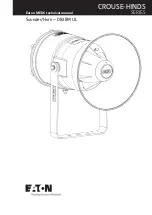
•
Locate the endoscopic accessories as central as possible in the endoscopic image by
adjusting the position of the distal end of endoscope, particularly while performing
papillotomy. When the distal end of endoscopic accessory is positioned in the left or right
side of the endoscopic image, and the elevator control lever is operated, the endoscopic
accessory may move abruptly, resulting in patient injury, bleeding, and/or perforation.
•
Do not use excessive force when operating, inserting or withdrawing endoscopic
accessories and make sure the accessory is visible on the endoscopic image. Otherwise,
the endoscopic accessory may extend from the distal end of the endoscope abruptly,
which could cause patient injury, bleeding, and/or perforation. Never emit high-fre
-
quency current before confirming that the distal end of the high-frequency endoscopic
accessory is in the endoscope’s field of view. Also, confirm that the electrode section and
the mucous membrane in the vicinity of the target area are at an appropriate distance
from the distal end of the endoscope. If the high-frequency current is emitted while the
distal end of the endoscopic accessory is not visible or too close to the distal end of the
endoscope, patient injury, bleeding, and/or perforation as well as equipment damage
can result.
•
While moving the elevator, do not open or close the distal end of the endoscopic accessory,
or extend the needle of the instrument. This could damage the endoscopic accessory and
could cause patient injury, bleeding, and/or perforation. If the endoscopic accessory cannot
be inserted or withdrawn, the distal end of the endoscopic accessory cannot be opened
or closed, or the needle of the instrument cannot be extended, move the elevator control
lever in the opposite direction of the "Up" direction to lower the elevator.
•
When the device is used with energized endoscopic devices, leakage current may be
additive. Use only endoscopic devices of type BF or CF. Check the compatibility of the
accessory/endoscopic device before use to any criteria for safe use.
Suction
•
Avoid aspirating solid matter or thick fluids; instrument channel, suction channel, or
suction valve clogging can occur.
•
When aspirating, maintain the suction pressure at the lowest level necessary to perform
the procedure. Excessive suction pressure could cause aspiration of and/or injury to the
mucous membrane. In addition, patient fluids could leak or spray from the biopsy valve,
posing an infection control risk.
Cautions
Indicates a potentially hazardous situation which, if not avoided, may result in minor or moderate
injury. It may also be used to alert against unsafe practices or potential equipment damage.
General
•
US federal law restricts this device for sale only by, or on the order of, a physician.
•
Keep the aScope™ Duodeno dry during preparation, use and storage.
•
The aScope™ Duodeno is not intended to be repaired. If defective the aScope™ Duodeno
should be returned to Ambu. For more information please refer to Section 6.1.
•
Electromagnetic interference may occur on this instrument near equipment marked
with the following symbol
or other portable and mobile RF (radio frequency)
communications equipment, such as cellular phones. If electromagnetic interference
occurs, mitigation measures may be necessary, such as reorienting or relocating this
instrument, or shielding the location.
Unpacking and Placing the Endoscope
•
Do not use a knife or another sharp instrument to open the pouch or cardboard box.
•
Place the aScope™ Duodeno on a level surface while unpacking. Dropping the aScope™
Duodeno could damage it.
8









































